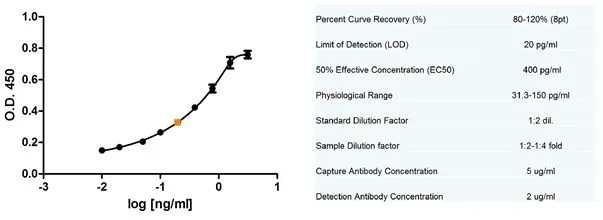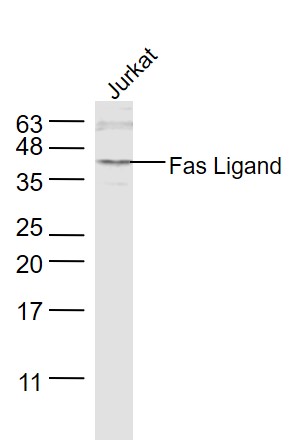![FACS analysis of Fas Ligand transfected CHO cells using GTX42345 Fas Ligand antibody [10F2] (Low endotoxin, azide free). FACS analysis of Fas Ligand transfected CHO cells using GTX42345 Fas Ligand antibody [10F2] (Low endotoxin, azide free).](https://www.genetex.com/upload/website/prouct_img/normal/GTX42345/GTX42345_3660_FACS_w_23060820_662.webp)
FACS analysis of Fas Ligand transfected CHO cells using GTX42345 Fas Ligand antibody [10F2] (Low endotoxin, azide free).
Fas Ligand antibody [10F2] (Low endotoxin, azide free)
GTX42345
ApplicationsFlow Cytometry, ImmunoPrecipitation, ELISA, Neutralisation/Blocking, Other Application
Product group Antibodies
ReactivityHuman
TargetFASLG
Overview
- SupplierGeneTex
- Product NameFas Ligand antibody [10F2] (Low endotoxin, azide free)
- Delivery Days Customer9
- Application Supplier NoteFACS: 1/25-1/50. Neutralizing/Inhibition: . *Optimal dilutions/concentrations should be determined by the researcher.Not tested in other applications.
- ApplicationsFlow Cytometry, ImmunoPrecipitation, ELISA, Neutralisation/Blocking, Other Application
- CertificationResearch Use Only
- ClonalityMonoclonal
- Clone ID10F2
- Concentration1 mg/ml
- ConjugateUnconjugated
- Gene ID356
- Target nameFASLG
- Target descriptionFas ligand
- Target synonymsALPS1B, APT1LG1, APTL, CD178, CD95-L, CD95L, FASL, TNFSF6, TNLG1A, tumor necrosis factor ligand superfamily member 6, CD95 ligand, Fas ligand (TNF superfamily, member 6), apoptosis (APO-1) antigen ligand 1, apoptosis antigen ligand, fas antigen ligand, mutant tumor necrosis factor family member 6, tumor necrosis factor ligand 1A
- HostMouse
- IsotypeIgG1
- Protein IDP48023
- Protein NameTumor necrosis factor ligand superfamily member 6
- Scientific DescriptionThis gene is a member of the tumor necrosis factor superfamily. The primary function of the encoded transmembrane protein is the induction of apoptosis triggered by binding to FAS. The FAS/FASLG signaling pathway is essential for immune system regulation, including activation-induced cell death (AICD) of T cells and cytotoxic T lymphocyte induced cell death. It has also been implicated in the progression of several cancers. Defects in this gene may be related to some cases of systemic lupus erythematosus (SLE). Alternatively spliced transcript variants have been described. [provided by RefSeq, Nov 2014]
- ReactivityHuman
- Storage Instruction-20°C or -80°C,2°C to 8°C
- UNSPSC12352203
References
- Tan X, Feng H, Guo Z, et al. Rabbit antithymocyte globulin induces human lymphocyte activation, proliferation, and apoptosis in the absence of complement: an experimental study. Transpl Int. 2021,34(5):930-941. doi: 10.1111/tri.13864Read this paper
- Dou R, Hong Z, Tan X, et al. Fas/FasL interaction mediates imbalanced cytokine/cytotoxicity responses of iNKT cells against Jurkat cells. Mol Immunol. 2018,99:145-153. doi: 10.1016/j.molimm.2018.05.011Read this paper






![FACS analysis of human CD178 (Fas ligand) transfected cells using GTX01476-02 Fas Ligand antibody [NOK-1] (Biotin). Solid lone : primary antibody Dashed line : isotype control antibody amount : 0.25 microg (5 microl)](https://www.genetex.com/upload/website/prouct_img/normal/GTX01476-02/GTX01476-02_20200428_FACS63_w_23053121_534.webp)
![FACS analysis of human CD178 (Fas ligand) transfected cells using GTX01476-07 Fas Ligand antibody [NOK-1] (APC). Solid lone : primary antibody Dashed line : isotype control antibody amount : 0.25 microg (5 microl)](https://www.genetex.com/upload/website/prouct_img/normal/GTX01476-07/GTX01476-07_20200428_FACS37_w_23053121_512.webp)
![FACS analysis of human CD178 (Fas ligand) transfected cells using GTX01476-08 Fas Ligand antibody [NOK-1] (PE). Solid lone : primary antibody Dashed line : isotype control antibody amount : 0.5 microg (5 microl)](https://www.genetex.com/upload/website/prouct_img/normal/GTX01476-08/GTX01476-08_20200428_FACS132_w_23053121_383.webp)